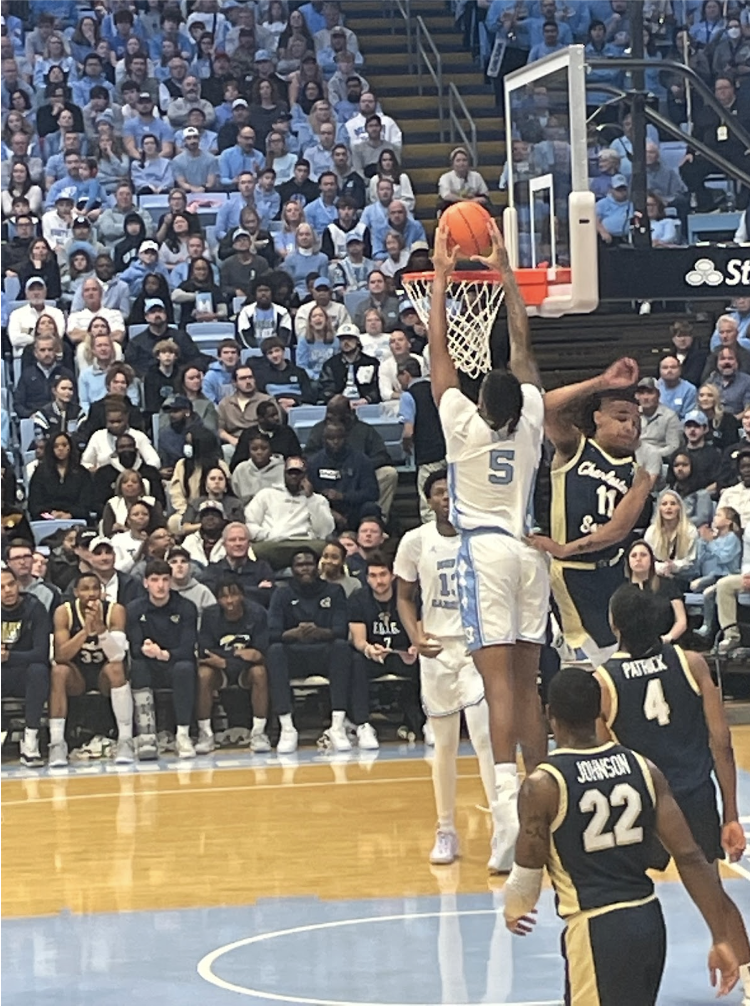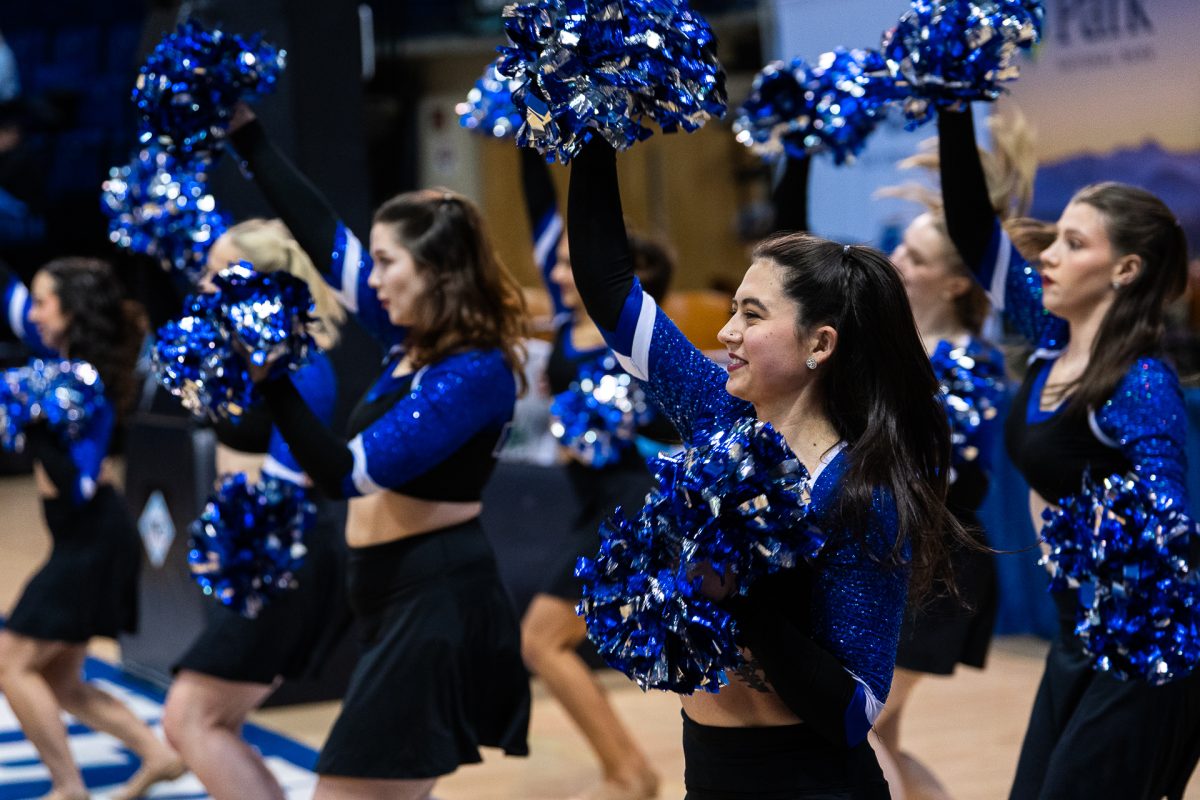The COVID-19 tests were negative, we put on our masks and jumped into the car as David Bowie blasted through the car speakers. My Mum and brother populated the car since my dad got COVID the day after Christmas and felt sickly from various illnesses such as the flu and the common cold since Thanksgiving. The end of the 2023 year did not treat him well.
“Did you grab the ADA parking placard Mum?” I asked, knowing it would be difficult to walk from a parking spot a mile away from the center and I needed accessible parking.
“ We don’t need it, our parking spot is very close, with only a short walk,” she said, but my brain still was concerned about the possibility of the lot being filled up and the possibility of walking a far distance.
It only took 30 minutes to get from Durham to the Dean Smith Center and you could sense how packed the building was from the crowd piling to get into the door. We parked in the lot closest to the facility with a sigh of relief and walked only a crosswalk length to get to the game. The dome-shaped building beckoned fans of all ages, genders and teams to come into it. The staff warmly welcomed us as they checked our tickets. After that, everything overwhelmed me as huge crowds swarmed all around me. Everything looked huge and loud, and I felt I needed to sit. Then I saw the stairs.
Steep stairs made a path down to our seats. These stairs gave most people but for me, someone who pretty much walks on one foot with the other one used as a balancer, my hand death gripped the railing as I slowly took one step at a time. As I walked to the seats I saw the huge screens at two corners of the Dean Dome as it is commonly known by fans. The operation looked massive to me. I forgot how much basketball means to the University of North Carolina at Chapel Hill community. It looked like I got premium tickets to an NBA game with the Chicago Bulls.
“ Phew!” I sighed as we sat down.
My exhausted legs relieved themselves of their duty. Five minutes later the P.A. announced,
“Please stand to honor the life of Eric Montross.”
I stood for the beautiful tribute by the team. After the tribute, they started to play the national anthem and we stayed standing. By the time the anthem got to “ Rockets red glare” my feet pulsed. By the end of the anthem, I needed to sit down even though everyone else did not. But I stood because I felt everyone would glare at me with disgust.
The P.A. started to announce the starting lineup. The arena went dark and flashing lights lit up by an app on the crowds’ cell phones. Yet I couldn’t see a thing. Fans blocked not only the view of the players as they announced them on the court but also the screen to look at the stats and information. All I could do was listen because I could not stand for long periods. They still stood until the tip-off happened. Then the crowd started to chant
“TAARRR”
“HEEELS”
The Tar Heels were scheduled to play Charleston Southern that night, a team that played in my university’s collegiate conference. It didn’t matter if Charleston Southern won or lost because my UNC Asheville Bulldogs played better than them.
In the corner of my eye, I saw the UNC student section. The UNC students cheered wildly, jumping up and down, swaying side by side as they locked arms together, they stomped, yelled and even waved their arms to give luck on their end.
They never sat at any point with an exception to half time.
Visually the student section looked inaccessible to someone like me and even more inaccessible to a wheelchair user because all the floor space was given to the media.
At halftime, my mum and brother got up to get food for us. I stayed back because I knew the stairs would be harder to go up than down and I needed my strength for the end of the game.
The game itself turned out to be a blowout for Chapel Hill with a 45-point lead of 105-60 win.
After we waited for the crowd to disperse a little, my mum, my brother and I got up and started to slowly climb the steep stairs. By the time I walked to the middle my legs felt like a fire burning. The simple crosswalk length distance became a thousand-mile climb to the summit of Mt. Everest that needed to be completed in a day.
At the top of the stairs, a wheelchair user sat in the accessible seating area. The area looked small and could probably only fit two people in it.
By the time we got to our car I couldn’t wait to sit.
As I sat and turned on the seat warmers I went,
“ Phew, I am so tired,” I said in my head.
Accessibility at sporting events are overall not great, but they do put some consideration into it. I feel like a lot of venues do not make information on accommodation very accessible unless you really look. I feel venues could make their facilities more accessible. One example is hire a sign language interpreter that is on the screens at game to interpret the P.A. without missing anything.
“I feel like there is always room for venues to be more inclusive; I also feel like we just don’t know what accommodations are in place already,” said Mary Poehlman, a parent of a disabled person.
Why is it that when you support a team or honor your country you have to stand. I feel like society idealizes able bodiedness as the highest honor you can have and it excludes a lot of people to the point that if you are not in a wheelchair you are looked down upon.
“ One simple thing venues could do to include people is to say, please rise if you can” when addressing the national anthem,” Poehlman said.
Even though many sporting venues are not the most accessible, UNCA’s Kimmel Arena is one of the most accessible and accommodating sporting venues I have been to in a while. For disabled UNCA who’ve wanted to go to a basketball game here at UNCA but have been worried about accessibility to the game, the arena is very accessible. Not only is the main student entrance accessible via an elevator ad there are plenty of areas that are accessible and has an equal level of viewing.


















